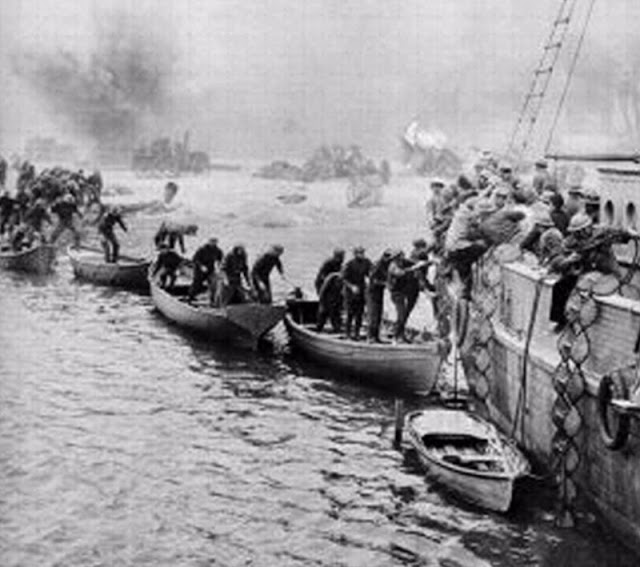In May of 1940, the Nazi army was overtaking Europe, pushing the Allied forces of Britain, France, and other European nations into retreat. After repeated Nazi incursions, it became apparent that the only way to defend the British Isles from invasion was to evacuate remaining Allied forces across the Straits of Dover. The British government had hopes of saving 30,000 to 50,000 troops in a Dunkirk evacuation before Germany made a mistake that cost them the war.
At Dunkirk, Hitler ordered frontline Panzeer divisions to halt their advance outside of Dunkirk. There are differing accounts as to why Hitler allowed the evacuation of Dunkirk to take place instead of dealing what could have been a crushing defeat to British forces trapped between the armored Nazi line and the English Channel. One theory is that Hitler allowed the British to evacuate Dunkirk as a humanitarian gesture in order to lure Britain into peace talks. What seems more likely is that he wanted to save the final blow to be delivered by Hitler’s revered air warfare division, the Luftwaffe.
Whatever the reason, Dunkirk became the primary evacuation point back to Britain for Allied forces. Dunkirk, however, was a difficult location due to its shallow waters and lack of a deep-water port. This kept British warships from being able to approach close enough for a large-scale rescue.
This led to the British Navy putting out a call for all shallow-draft vessels to join the British Navy in a mass evacuation of Dunkirk. The evacuation became a heroic effort that saved 340,000 lives between May 28 and June 6. British Naval Reserves scoured southeastern Britain in the search for any small craft that were either volunteered or requisitioned into service. In total, over 700 boats gathered in Ramsgate, England, to assist in the 10-day evacuation.
Over those ten days, the armada of little ships made multiple trips between the beaches of Dunkirk, British warships, and the beaches of England. The smoke from Dunkirk and the inclement weather helped shroud the beaches and ships, but when the weather cleared, the Luftwaffe was able to strafe and bomb ships and the beaches where 5,000 men lost their lives. The evacuation of Dunkirk is most interesting for how it turned from a humiliating British and Allied defeat into a story of heroism that boosted the spirits of Allied forces.
(via PassageMaker)
At Dunkirk, Hitler ordered frontline Panzeer divisions to halt their advance outside of Dunkirk. There are differing accounts as to why Hitler allowed the evacuation of Dunkirk to take place instead of dealing what could have been a crushing defeat to British forces trapped between the armored Nazi line and the English Channel. One theory is that Hitler allowed the British to evacuate Dunkirk as a humanitarian gesture in order to lure Britain into peace talks. What seems more likely is that he wanted to save the final blow to be delivered by Hitler’s revered air warfare division, the Luftwaffe.
Whatever the reason, Dunkirk became the primary evacuation point back to Britain for Allied forces. Dunkirk, however, was a difficult location due to its shallow waters and lack of a deep-water port. This kept British warships from being able to approach close enough for a large-scale rescue.
This led to the British Navy putting out a call for all shallow-draft vessels to join the British Navy in a mass evacuation of Dunkirk. The evacuation became a heroic effort that saved 340,000 lives between May 28 and June 6. British Naval Reserves scoured southeastern Britain in the search for any small craft that were either volunteered or requisitioned into service. In total, over 700 boats gathered in Ramsgate, England, to assist in the 10-day evacuation.
Over those ten days, the armada of little ships made multiple trips between the beaches of Dunkirk, British warships, and the beaches of England. The smoke from Dunkirk and the inclement weather helped shroud the beaches and ships, but when the weather cleared, the Luftwaffe was able to strafe and bomb ships and the beaches where 5,000 men lost their lives. The evacuation of Dunkirk is most interesting for how it turned from a humiliating British and Allied defeat into a story of heroism that boosted the spirits of Allied forces.
(via PassageMaker)










.jpg)





